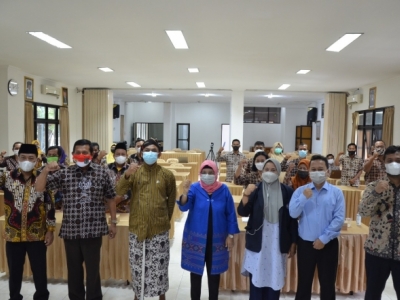UNY IS COMMITTED TO DEVELOPING THE POTENTIAL OF THE VILLAGE

Universitas Negeri Yogyakarta has long been active in reviving the rural economy, one of which was in 2001 in the village. One example is Dusun Kiran Canden Jetis Bantul with empowerment and mentoring program through mentoring and empowerment collaboration with IPTEKDA-LIPI (Regional Science and Technology – Indonesian Institute of Sciences) , followed by collaborative mentoring program between universities. This herbal medicine business continued to grow but faced obstacles when the earthquake occurred in 2006. Universitas Negeri Yogyakarta and UNDP (United Nations Development Program) tried to revive the herbal medicine business after the earthquake by forming Kelompok Jamu Seruni Putih and Koperasi Seruni Putih. In 2009 UNY assisted MSMEs in Gulurejo Lendah Kulonprogo by empowering batik artisans in Mendiro Hamlet in collaboration with AusAID. In that year, the MSMEs batik craftsmen of Mendiro Hamlet were invited to participate in the exhibition to introduce Mendiro's batik products to consumers more broadly. Every year, Universitas Negeri Yogyakarta guides MSMEs for these herbal medicine craftsmen to help increase the capacity of MSME artisans in terms of product quality, marketing, and others. So said Prof. Nahiyah Jaidi, Head of the UNY Business Incubator Innovation Center, in the UNY Rural Development workshop at LPPM UNY Thursday (2/12). Furthermore, UNY always pays attention to MSMEs in the village and develops them according to UNY's capabilities. "Hopefully, this workshop can bridge prospective partnership among villages and UNY," she said.
Another speaker in this workshop is Dr. Eng Faqih Ma'arif, who explained that the grand design of UNY Mbangun Desa is the preparation of a regional development plan by taking into account the strategic plan of the village as well as the conditions and directions of its strategic policy. The UNY Faculty of Engineering lecturer gave an example of the grand design of the herbal village package that can be used as a tourist village, a cultural village, and a digital village at the same time. "We can open a place for supplying materials with a medicinal garden tour and tours for storing materials," he explained. In addition, production sites, workshops for making herbal medicine, and waste treatment can be used as tourist attractions. Tourists are invited to the pavilion where SMEs retail sales are final. It should not be forgotten that there must also be public facilities such as toilets, prayer rooms, food courts, and parking locations. Faqih also gave an example of the central village of Canden herbal medicine by establishing an Omah Jamu museum which is equipped with an identity monument and workshop space.
This activity was organized by the Planning and Cooperation Division in the Domestic Partnership sector with LPPM UNY. It was attended by Panewu Lendah Kulonprogo, Panewu Jetis Bantul, and the hamlet heads from the two Kapanewon. This activity was opened by the Secretary of LPPM Prof. Siti Irene Astuti, who said that the village is now an icon that can move the community to quality with things that can actualize what is in the village. "The quality of the village community determines state development," said Siti Irene Astuti. Therefore, village officials can collaborate with UNY to discuss matters that have not been honed, both in terms of human resources and natural resources. For this reason, the presence of workshop participants at LPPM can share what can be developed and shared.
Panewu Lendah Sutrisna said the residents of Gulurejo were grateful to UNY for unlocking the potential of the Gulurejo community. "We from Kapanewon were confused about where Gulurejo was going," he said. However, the arrival of UNY in collaboration with Gulurejo was very helpful in developing the existing potential. Sutrisna hopes that in the future, this potential will develop optimally. The head of Gulurejo, Bejo Santoso, hopes that LPPM in the future can collaborate to see other potentials in Gulurejo that have not been appropriately managed, especially in the field of tourism villages and MSMEs. Beja, Head of Canden said that more than 70% of Indonesian citizens live in rural areas. For this reason, a ministry in charge of rural areas was formed at this time. "There is much potential in the village that has not been managed properly," he said. Therefore, the presence of UNY gives hope that in the future, it will be able to raise potential so that villagers do not need to go to the city to look for work because everything is in the village. This activity is one of UNY's efforts on the sustainable development agenda in terms of partnerships to achieve goals. (Dedy, Tj.Lak)

